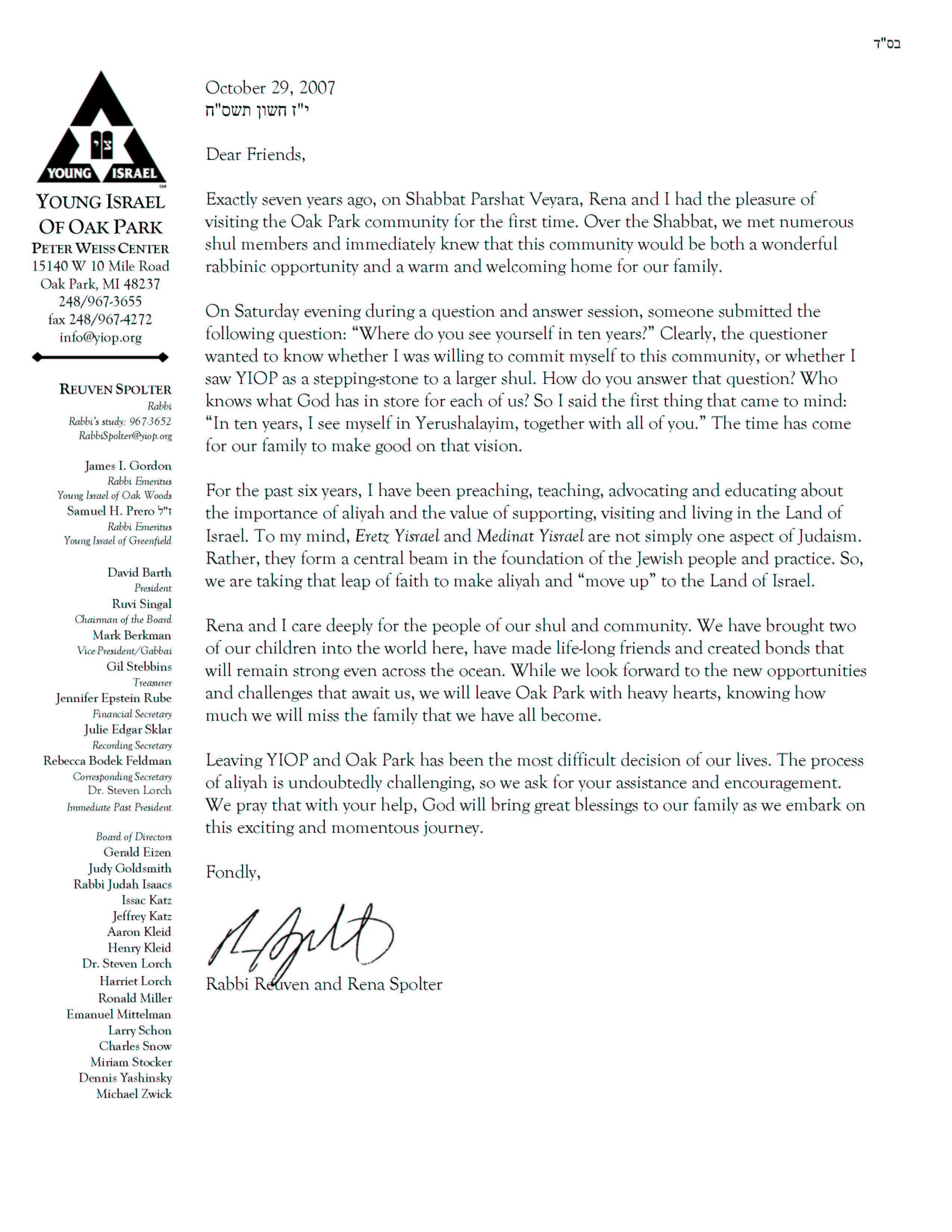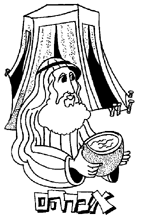
Two interesting but seemingly unrelated articles appeared in the Rosh Hashanah Edition of
Detroit's Jewish News. The
first piece, describes the sale by
Congregation Sha'arei Zedek of it's Laker Educational Center in West Bloomfield to
Temple Shir Shalom. While seemingly un-noteworthy, a couple of interesting points caught my attention:
"The reason we are selling the building is that during the last few years, its usage was less than in previous years, primarily due to the fact that we reduced our educational requirements for attendance by one day," [Sharei Zedek Executive Director Janet] Pont said.
Interesting. But there's more.
Those plans are highlighted by what Shir Shalom Rabbi Dannel Schwartz calls "changing the paradigm of what synagogues do. We are ready to interface and create a bridge bringing our two congregations together," he said. "And that will give us four rabbis instead of two."
Calling it a significant initiative, he said, "The whole concept of the building is synergy. We will begin with an adult education program for both congregations next month. And it has been proposed that our religious school kids do programming together as well."
Enthused by the upcoming efforts of the two congregations, CSZ Rabbi Eric Yanoff maintains that although there will be combined programming between members of both synagogues, there is absolutely no talk of merging CSZ and Shir Shalom.
Of course there won't be a merger. After all, we're talking about two streams of Judiasm, with very different outlooks and perspectives on core Jewish values. Or are we? How else would they be able to share not only classroom space, but also rabbis and programming? In the end, what difference does it make if there's a technical merger or not, if the two congregations work together, establish programming together, and share rabbinic duties together? Where's the line between coexistence and cooperation, and merger?
Moreover, the entire tone of conciliation and accommodation in the piece raises serious questions for me -- not about Shir Tikveh -- I know what Judaism they stand for -- but about Shaarei Zedek. What do they actually teach in their supplementary religious school? How in the world can they consider sharing religious school programming with a Temple that preaches doctrine completely alien to Conservative Judaism's teachings?
In the same issue, JN publisher Arthur Horowitz
wrote a piece suggesting a number of bold changes intended to bolster the Conservative Jewish community over the next five years. While a number of his ideas were indeed important and positive, one of them actually shocked me. He suggests the merger of Congregations Shaarei Zedek and
Adat Shalom, creating a mega-congregation (the largest in the country), that would be able, due to its strength and size, to cater to the community better than the two congregations now can. I have a few simple questions:
- What does this say about the nature of each of the congregations right now? It seems that in Horowitz's mind, shuls are just like department stores. They're really all the same, and people only care about the departments and services that they offer. That being the case, why not merge every single conservative synagogue in the region to form one mega-shul with a large number of different prayer services available, from the traditional style sanctuary service to a music-filled ruach service to a family service, a youth service, a babysitting room, and perhaps even a Yoga service. (I wish I were kidding about that one.) After all, wouldn't it be more cost-effective to merge secretarial services, maintenance, overhead -- and all the other costs associated with running a synagogue?
- How does shrinking the number of synagogues actually strengthen the community? Doesn't diversity in numbers of institutions strengthen us, and not the opposite? Have the Conservative mergers of the past strengthened the Conservative community, or only further weakened it?
- Finally, and perhaps most importantly, it seems to me that Horowitz views the shul - and any religious institution from entirely the wrong perspective. A shul is not a business out to make money. It doesn't sell a product. It's a house of worship - a mikdash me'at -- a House of God. It must connect with people's hearts and minds, and become a spiritual home for its members and the community at large. Mega-shuls (and Churches) might offer services, but no one ever felt at home at Walmart or Costco, and without that sense of connection and spirituality, Judaism will never convey the warmth and authenticity that motivate people to grow closer to God. And let's not forget that the ultimate goal of a synagogue is not balancing the budget (not to say that's not important): it's connecting its membership with God.
While lowering the Hebrew school requirements (probably to cater to demands of parents unwilling to bring their children three days a week) might seem harmless, that concession ultimately leads to the closing of the synagogue - or its merging with another. (Any way you look at it, one shul in a merger closes). While this might seem harsh, it's actually rather obvious to me, because diluting what you stand for makes your members wonder what it is you actually provide, and why they should value membership at all.
We're watching the gradual dilution of Conservative Judaism both in our community, and across America. They lose adherents and members for the precise reason that they don't actually know what they want to, or should be. Therefore, in a bid to remain competitive for membership, they dilute their Judaism while at the same time reaching out to every possible constituency, and allow the dilution of their denomination.
This ambivalence will continue to destroy Conservative Judaism, until we're left with two major movements: Orthodox, and not Orthodox. And to be honest, that really does make me sad, because too many Jews, unwilling to make the leap to an Orthodox synagogue, will find themselves on the slippery reform slope to assimilation and intermarriage.
While the Orthodox community might consider itself unconcerned with these matters (and many refuse to even read the Jewish News anymore), if we're concerned with the future of the Jewish people, it really is our problem. Kiruv cannot possibly reach enough people. Conservative Judaism used to play a critical role for the Jewish people, offering those unable or willing to commit to a life of frumkeit an option that at least resembled traditional Jewish practice. That, it seems, is slowly melting away, and that loss is one we must mourn.
What can be done? How can Conservative Judaism grow and thrive in Detroit?
- Build smaller shuls. We need small synagogues -- or smaller branches -- in more places. From what I hear, Shaarei Zedek's branch in West Bloomfield is doing just fine. It has a heimish atmosphere, a nice chevra, and a sense of community. Why not build (or create) another branch in Huntington Woods, and yet another in Berkeley, and another in Commerce Township, each with its own dedicated rabbi, and each its own feel, and each its own sense of family? Better yet, who needs branches of a larger shul? Smaller is better, more intimate, and less costly. Moreover, smaller shuls demand more member involvement and less reliance on professional staff. My shul runs hundreds of classes throughout the year and tens of programs for youth, families and adults. How do we do it? People volunteer because they realize that if they don't get involved and active, no one else will. Sure, we could use more help, and there's never enough volunteers, but there's no feeling like walking into a kiddush prepared not by a caterer, but by the shul membership. And there's no greater feeling than attending a program organized, arranged and run by shul members. You'll never have that feeling in a mega-shul.
- Get rid of Hebrew Schools entirely. They don't work. I have never met a person who went to Hebrew school who didn't hate it. If Conservative Judaism is to survive, it will have to teach its members that Jewish Day School is not an option -- it's a necessity. And, as peer pressure grows to send children to Hillel, more families will do just that, and integrate the religiosity of the school into family life. Fortunately, that simple move will save the synagogues their greatest expense, allowing them to remain small and financially viable.
- Get serious about halachah. To quote "E-Loan", people are smart. They get authenticity. And sometimes that means saying "no" -- both to homosexuality (which traditional Jews understand the Torah prohibits - despite anyone's good intentions), and especially driving to shul on Shabbos, which the former chancellor of JTS acknowledged was a cardinal error, and probably the beginning of the decline of the movement. These small shuls must start insisting that their members walk to shul. They must insist on kashrut, both in shul and at home, and also at the parties they attend and the Bnei Mitzvah they celebrate. The must talk about mitzvot not as good deeds, but as commandments. As they must acknowledge that in the Torah God gives two types of commandments: positive commandments, and negative ones, all equally binding. Without the word "no" halachah is meaningless, and everyone, including laypeople, intuitively know it.
We in the Orthodox community must be ready to reach out to traditional families, welcoming them into our homes and our shul, giving them the sense of authentic Judaism and warmth that they've been missing. It sounds simple -- but it's actually quite difficult to maintain our own sense of identity and integrity while still remaining open to newcomers unfamiliar with Orthodox practice and ritual. I'm not just talking about kiruv, which we already do. I'm speaking of changing the closed-door mentality so prevalent in Orthodox life, and pervasive in our homes, shuls and even schools. We've started moving in that direction, but to make a significant and meaningful difference, we will have to accelerate what will undoubtedly be a painful and difficult process.
As you can see, I'm pretty passionate about this issue, because I feel it's so critical for the Jewish community. Will the Conservative congregations take my advice? I doubt it.
But then don't be surprised if, one day soon we do see a merger between Adat Shalom and Shaarei Zedek, and then not long after that, another merger between "Adat Zedek" (or "Shaarei Shalom"?) and Shir Tikveh. And then there won't be anything left of Detroit -- or America's -- Conservative Community.
 On average, each and every day three shells, mortars or Katyusha rockets land somewhere in
On average, each and every day three shells, mortars or Katyusha rockets land somewhere in 
















